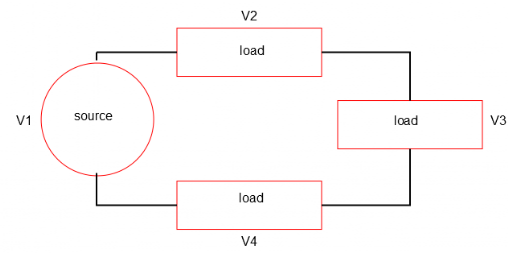US Patent 7,791,353 B2
Introduction
Simple Circuit Concepts
Transmission lines
Faraday's law
Near and far fields
Spurious coupling mechanisms
- Direct conduction
- Capacitive coupling -problem
- Capacitive coupling -fixing
- Inductive coupling-problem
- Inductive coupling -fixing by twisted
- Inductive coupling -fixing by coax
- Electromagnetic pickup
- Examples
- Safety & star grounding
- Gnd loop resistance, inductance
- Low frequency behavior
- High frequency behavior
- Troubleshooting
- Methods for removing
Kirchoff's laws
Kirchoff's current law essentially states that there has to be a circuit, i.e., that there has to be a return conductor.
Kirchoff's voltage law can be considered the basis of electronics, where electronics means a circuit containing various elements. Kirchoff's voltage law provides a means for unifying the behavior of different types of circuit elements by stating that the sum of the voltages contributed by each circuit element around any closed circuit is zero; see Fig.2. For AC circuits Kirchoff's voltage law is superseded by Faraday's law and invoking Kirchoff's voltage law when Faraday's law should be used leads to incorrect conclusions regarding the cause of ground loops.
Kirchoff's current law essentially states that there has to be a circuit, i.e., that there has to be a return conductor.
Kirchoff's voltage law can be considered the basis of electronics, where electronics means a circuit containing various elements. Kirchoff's voltage law provides a means for unifying the behavior of different types of circuit elements by stating that the sum of the voltages contributed by each circuit element around any closed circuit is zero; see Fig.2. For AC circuits Kirchoff's voltage law is superseded by Faraday's law and invoking Kirchoff's voltage law when Faraday's law should be used leads to incorrect conclusions regarding the cause of ground loops.

Find ground loops fast!
-eliminate electical interference, fix star grounding
-eliminate electical interference, fix star grounding
US Patent 7,791,353 B2
Figure 2. Kirchoff's voltage law: sum of voltages around circuit (measured in same sense) is zero, i.e., V1+V2+V3+V4 =0.
For quotes, purchase orders, shipping outside USA, questions contact
Circuit Insights LLC, Pasadena, California, USA
Email: sales@loopslooth.com Tel: 626-201-0488